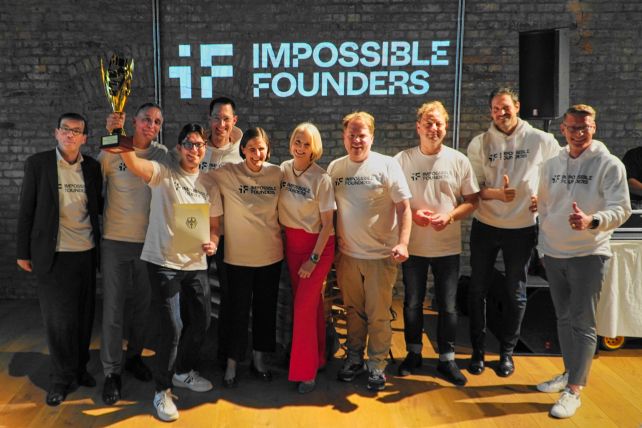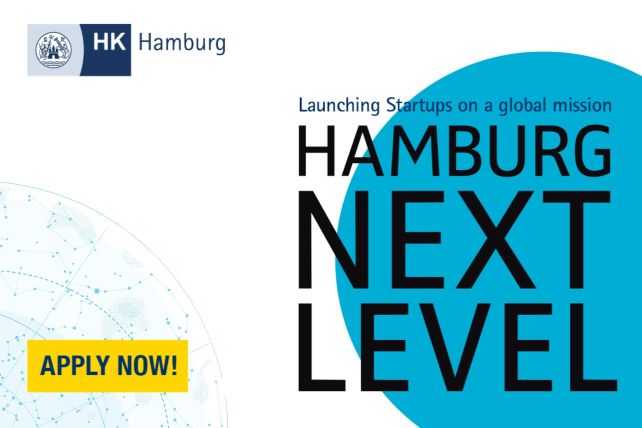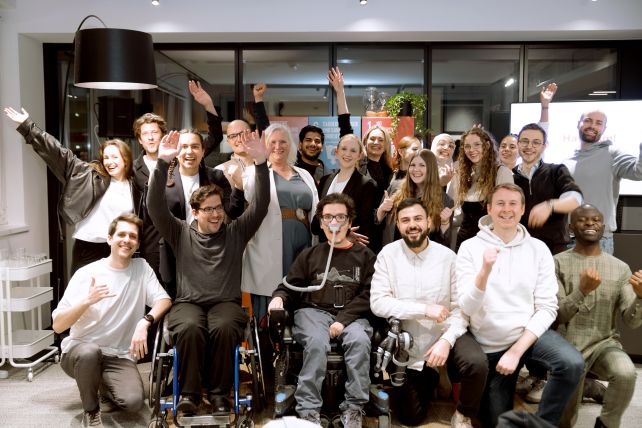Scaling - how startups succeed in growing
Startups are companies with an innovative business idea and high scaling potential - this is the most common definition. Rapid growth brings with it a number of challenges that startups have to overcome if they want to be successful in the long term. We provide tips on how this can be achieved.

Starting small: Apple was once a startup too
The story of many startups begins with two or three people working together with an idea to improve the world and make big business. This was also the case with Steve Jobs, Steve Wozniak and Ronald Wayne in 1976. Jobs was the visionary, Wozniak the tech genius and Wayne the man who was supposed to take care of the day-to-day business at Apple. He left the newly founded company after just eleven days. The first lesson can be learnt from this: Keep your eyes open when choosing the founding team! The combination of different characters and competences must fit and complement each other. However, the early departure of a co-founder did not detract from the success of the garage company; Apple developed into the most valuable company in the world.

Beiersdorf - from startup to global player
A triumph like Apple's will remain an unattainable dream for the vast majority of people, but it at least shows that even the biggest companies once started small. When Hamburg's First Mayor Dr Peter Tschentscher talks about startups, he likes to cite Beiersdorf, today best known for the personal care brand Nivea, as a historical example. It all began in 1882 with a patent by pharmacist Paul C. Beiersdorf for the production of medical plasters. Over the years, this led to the development of two brands that are still synonymous with their product category today: tesa and Hansaplast.
Two further lessons can be learnt from this example. Firstly, the original idea does not always have to be the best, but it can lead to the actual successful product. In startup jargon, this is called a pivot. Secondly, it is advisable to start with a specific product and develop it iteratively in line with market requirements. The range can then be expanded later, for example at Beiersdorf with the lip balm Labello and the world-famous Nivea cream.

Building a team in a startup: from family to nation
If the first steps for the young company have been successful, the core crew of two to three people usually does not last long. Building a team involves a number of challenges. In the beginning, things are ideally still almost family-like, which is why this phase in a growth model is also referred to as the ‘family’. It describes a team size of up to nine people. The other phases are ‘tribe’ (up to 100 people), ‘village’ (up to 1,000 people), “city” (up to 10,000 people) and ‘nation’ (more than 10,000 people).
The first hierarchies can already form with larger ‘families’, but this is inevitable with more extensive teams. Founders, who often started out on the basis of very personal experience, then have to learn to relinquish competences and control. This is no easy task, as new employees lack intrinsic motivation. Startups that are already commercially successful can compensate for this with high salaries. Others offer the lure of high bonuses in the event of an IPO or exit. For many employees, the social benefits of a startup are also a decisive factor, or the opportunity to get directly involved in internal processes and have a real influence.
The prerequisite for team growth is, of course, that suitable specialists can be found. This is by no means a given for startups operating in the high-tech or scientific fields, for example. IT experts are also in high demand. This is why the search for personnel is not only focused on the German labour market. According to the German Startup Monitor 2024, the most important source of information about the startup scene in Germany, the proportion of foreign employees is almost 31%. They do not necessarily have to leave their home countries, which makes them easier to recruit. Another advantage may be lower labour costs, while considerable time differences, language barriers and a lack of control can be disadvantageous. On the other hand, for integration into the German labour market the high level of bureaucracy is an obstacle. Startups such as Localyze from Hamburg have therefore specialised in making this onboarding easier.
Umtriebig helps startups to grow their numbers
We took a look behind the scenes of exciting startups and present UMTRIEBIG: a company builder that brings your impact startup on track. From sharpening the founder's profile, to sustainable business model development, to a sales and marketing concept.


Startup financing: If you want to grow, you need capital
Larger teams cause higher costs, and this is just one of many factors that drive up expenses during the growth process. Added to this are marketing, rents, the purchase of production-related equipment and much more. In short: startups are constantly on the lookout for money and only in the rarest of cases can they finance themselves from their profits. The search for investors is therefore an ongoing task. In the German Startup Monitor 2024, 74% of respondents stated that they wanted to raise external capital in the next 12 months. An EXIST startup grant, accelerators or funding programmes often help with the launch. In Hamburg, IFB Innovationsstarter GmbH offers a particularly wide range of programmes.
The provision of equity capital is always associated with the sale of company shares. In the first round of financing, known as pre-seed, only smaller sums are usually called for, which is why startups should act cautiously here. Otherwise there is a risk of diluting the so-called cap table at an early stage by getting too many shareholders on board too soon. There must still be enough room for the next rounds - seed, series A and so on - to be able to sell further shares without losing the majority. Possible investors for the classic financing rounds include business angels, who contribute smaller amounts but provide more personalised advice. And large venture capital companies (VCs), which are indispensable, especially for financing in the millions.
In a startup on a growth trajectory, it can happen from time to time that the priorities of a founding member shift or different views on the direction of the company develop. The result: this original member of the team leaves, which can have considerable legal consequences. Binding rules in the event of such a situation should therefore be defined and contractually recorded.

Legal issues also need to be considered in other areas from the outset. This applies, for example, to the legal form of the company, which is relevant for the future direction - exit, IPO or forever in your own hands. In most cases, the GmbH is a good choice. If a startup's business model is based on a genuine technological innovation, it is important to check who owns the rights to it and whether it is possible and sensible to apply for a patent. It is also important to clarify whether the company name and internet address are still available and keep the research not just limited to Germany. Otherwise, it can lead to expensive complications when scaling up internationally at the latest.
Checklist for successful startup growth
In very few cases is there a person with specific legal knowledge in the initial phase of a startup. It is therefore advisable to buy in this expertise. The same applies to tax matters. The good news is that many law firms and business consultancies offer discounted rates for startups in the hope that they will develop into financially strong clients. We have put together a few tips for you here to help you achieve this:
Think from the customer's perspective right from the start and base your offer on the feedback you receive from customers. High customer satisfaction ensures stability and continuity.
Put your business model to the test if you are not making progress in sales. A switch from B2C to B2B is often the solution.
At the beginning, startups often win over their customers with personalised advice and product development. However, in order to scale, it is necessary to automate as many processes as possible without neglecting the service concept. This is done, for example, by switching from project-based work to a software-as-a-service offering. Artificial intelligence is increasingly becoming the tool of choice for increasing efficiency.
Don't be too hasty when it comes to growth. ‘Exponential’ sounds tempting, but ‘slow but steady’ organic growth is often the better and more sustainable way.
If at all possible, build up a financial cushion for bad times, then a delayed financing round will not immediately cause you existential difficulties.
Seek advice from other founders who have already successfully grown their startups. This direct exchange often provides valuable insights for your next practical steps.
Don't neglect your health. In the beginning, seven-day weeks and 15-hour days may be unavoidable and justifiable. However, this is not sustainable in the long term. For literally healthy growth, you need breaks and time off. Of course, this also applies to employees.
‘Fake it till you make it!’ - This is a popular motto in the startup world, but one that should be taken with a grain of salt. If you make big promises but can't keep them, you quickly lose the trust of customers and investors. Honesty when things don't progress as quickly as desired is better received.
Failure is allowed! A high percentage of startups do not manage to become profitable. In this case, it is important to find the right time to stop. This does not have to be the end of the startup life. Many founders only become really successful in their second or third founding attempt.
Growth is a process that is always associated with major changes and hardly ever runs smoothly. It is linked to too many factors that can only be influenced to a limited extent. However, where it is possible to exert influence, you should be well prepared in order to avoid mistakes and be able to accelerate growth instead of slowing it down. This applies to many areas of life and even more so to scaling startups. Founders with special skills are in demand. When asked what these are, the German Startup Monitor gives these five most frequently mentioned answers: resilience, analytical skills, communication, vision and strategy.









